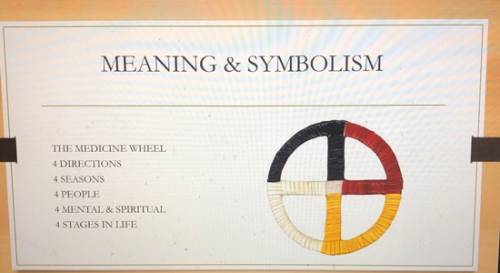‘Celebrating Longevity’ features Native American, Hispanic and Korean traditions
by Scott O’Neill | Presbyterian News Service

Fern Cloud led a webinar on Native wisdom last week as part of Presbyterian Older Adult Ministries Network’s Celebrating Longevity Around the World series. (Contributed photo)
LOUISVILLE — To help congregations prepare for Older Adult Week, which starts Sunday, the Presbyterian Older Adult Ministries Network (POAMN) presented the first of three webinars as part of its Celebrating Longevity Around the World series. The webinars are focused at looking at different cultures as a way to learn more about how to honor and value older adults.
Thursday’s webinar was titled “The Circle of Life,” and featured speaker Fern Cloud, a citizen of the Sisseton-Wahpeton Dakota Oyate, on the Lake Traverse Reservation in Agency Village, South Dakota. The Circle of Life has been referred to as a medicine wheel, or sacred circle, by the Dakota Oyate nation and others for generations. It’s used for health and healing and as a tool for learning and teaching. It symbolizes four directions, four seasons, and four stages of life.

The medicine or sacred wheel symbolizes many things in Dakota culture. (Screenshot)
“There are many beautiful stories that encompass a way of life for us,” said Cloud. “The medicine wheel is a cross within the circle and has many meanings and much symbolism — most often the four directions, but it’s also symbolic of the four seasons in nature.”
“The circle also brings meaning to the four parts of our being: we have the physical part of us, the emotional part, and the mental and spiritual parts of us. All of this makes up who we are.”
Cloud, who is Stated Clerk and Treasurer of Dakota Presbytery and pastor of Pejuhutazizi Presbyterian Church on the Upper Sioux Dakota Community in Granite Falls, Minnesota, opened the gathering in prayer thanking God in celebrating the wintertime of our life, the time when God is most clear and close to us. She said that the wheel also symbolizes the four stages of life: birth, adolescence, adult and elder.
“The physical body that we have is the body our spirit inhabits during our full circle of life. The four stages also bring meaning and life experiences, and we come into the circle when we are born. We travel around adolescence and go into adulthood, then we come into the most important part of the circle — our elder,” said Cloud.
An overarching theme of Cloud’s presentation revolved around elder responsibilities. Leaving the adult phase and coming into being an elder is extremely important to Indigenous cultures. Cloud joked that unfortunately there are a lot of old people but very few elders.
“Being an elder encompasses so much responsibility: taking all the experiences that you’ve had throughout the circle of life from birth to entering eldership and learning how to take care of your mental and physical health,” noted Cloud. “There is a lot of responsibility being an elder and you have to learn how to be confident. It’s a wonderful time but also a big responsibility.”
The wisdom of elders is a significant part of the Dakota culture. Many elders possess knowledge which has passed from generation to generation, which is an oral tradition. During the winter families would gather and the elders would tell stories to the children.
“Winter was a very important season for us,” said Cloud. “It was a time of learning. The traditional knowledge of elders extends to telling your family about your relatives, so I know who my people are and where I come from because my elders taught me that. This is the type of traditional knowledge elders hold. Our technology is taking us away from this relationship.”
In addition to traditional knowledge, kinship, spirituality, parenting, and health and well-being are all key components of elder wisdom, according to Cloud. She wrapped up her presentation defining wisdom as “the accurate application of knowledge,” and teachings from the Book of Job and other wisdom literature:
“Wisdom is found with the elderly and understanding comes with long life. Is not wisdom found among the aged? Does not long life bring understanding? Wisdom belongs to the aged and understanding to the old. Wisdom is with the aged and understanding in length of days.”
The three webinars in the Celebrating Longevity Around the World series are offered in partnership with the Presbyterian Mission Agency’s Office of Christian Formation. The next webinar takes place at 3 p.m. Eastern Time on Tuesday. The topic is “Older Adults of Hispanic Heritage” and is available in Spanish and Korean. The third webinar, “Korean-American Traditions,” will be held at noon Eastern Time on May 7. For more information and to register for the webinars, visit the POAMN events web page. A recording of “The Circle of Life” webinar will also be available.
![]() You may freely reuse and distribute this article in its entirety for non-commercial purposes in any medium. Please include author attribution, photography credits, and a link to the original article. This work is licensed under a Creative Commons Attribution-NonCommercial-NoDeratives 4.0 International License.
You may freely reuse and distribute this article in its entirety for non-commercial purposes in any medium. Please include author attribution, photography credits, and a link to the original article. This work is licensed under a Creative Commons Attribution-NonCommercial-NoDeratives 4.0 International License.
Categories: Christian Formation, Partner Associations
Tags: celebratring longevity around the world, dakota culture, dakota presbytery, fern cloud, job, partner associations, Pejuhutazizi Presbyterian Church, Presbyterian Older Adult Ministries Network, the circle of life, wisdom literature
Ministries: Partner Associations, Theology, Formation & Evangelism, Office of Christian Formation